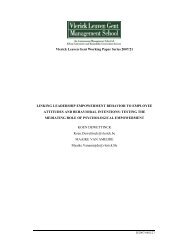Vlerick Leuven Gent Working Paper Series 2007/03 ... - Vlerick Public
Vlerick Leuven Gent Working Paper Series 2007/03 ... - Vlerick Public
Vlerick Leuven Gent Working Paper Series 2007/03 ... - Vlerick Public
Create successful ePaper yourself
Turn your PDF publications into a flip-book with our unique Google optimized e-Paper software.
They suggests that the board of directors can serve the CEO and management with<br />
their expertise through their active involvement in the strategic decision-making process,<br />
particularly by advising top management on the initiation, formulation and implementation of<br />
strategy (Carpenter and Westphal, 2001; see also the review by Johnson et.al., 1996). By<br />
consequence this approach blurs a clear distinction between the service and the strategic role<br />
of a board of directors.<br />
Finally, the strategic role of the board of directors has historically been subject to<br />
much dispute, especially in the management literature (see e.g. the discussions in various<br />
issues of Harvard Business Review from the beginning of the 1980, edited by Kenneth<br />
Andrews). The strategic role of the board taps insights from different theoretical perspectives.<br />
In essence, two broad schools of thought on the involvement of boards in strategy can be<br />
detected, referred to in the literature as “active” and “passive” (Golden and Zajac, 2001). The<br />
passive school views the board of directors as a rubber stamp or a tool of management with<br />
little or no impact on a company’s strategy process. In contrast, the active school views the<br />
board of directors as an ‘independent’ body who actually contributes in shaping the strategic<br />
course of a company and in guiding the management to achieve corporate mission and<br />
objectives (Maassen, 1999; Hung, 1998). The board’s contribution can occurs in a myriad of<br />
ways such as through advice and counsel to the CEO, through careful refinements of strategic<br />
plans, by initiating own analyses or suggesting alternatives, by probing managerial<br />
assumptions about the firm and its environment, or by ensuring that agreement exists among<br />
executives on the strategic direction on the firm (Zahra, 1990; Zahra and Pearce, 1989).<br />
According to Goodstein et.al. (1990) the strategic role is of particular importance in critical<br />
cases such as periods of environmental turbulence or declines in company’s performance,<br />
because such events provide the opportunity to a board to initiate strategic change. As pointed<br />
out by different scholars, the active school of thought is receiving growing attention and is<br />
graining ground (Hendry and Kiel, 2004; Finkelstein and Hambrick, 1996). An overview of<br />
the three board roles and the functions that make up each role is presented in Appendix 2.<br />
Although the literature recognizes three board roles, the importance attach to each role<br />
is not equal. As agency theory dominates corporate governance research, it is obvious that the<br />
board’s control role is emphasized as the most important one and this role is well-documented<br />
by a rich body of empirical literature. At the same time, the importance of the board’s<br />
strategic role is supported by a limited but increasing amount of empirical research.<br />
12










